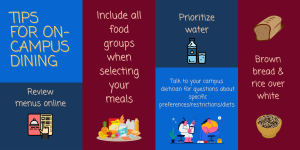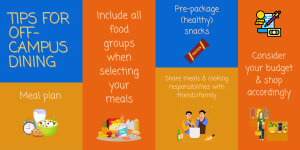Chapter 6: Personal Considerations
48 Health and Nutrition
Physical health refers to the well-being of your physical body. It’s not uncommon for people to describe themselves as being in good health simply because they aren’t sick or don’t have a medical condition. However, being in good physical health involves a lot more than the absence of disease. In order for your body to function at its peak, you need to commit to pursuing a healthy lifestyle that involves having balanced nutrition, getting adequate rest and sleep, and performing regular exercise. Most people underestimate the work that goes into actively caring for their body’s well-being, but it is crucial to take the time to care for your basic physical needs, not only to reduce the risk of injury or disease but to optimize your ability to do well at school and improve your quality of life as a whole.
Nutrition
Starting college likely means your schedule and daily routine are going to change. We have already discussed how to best schedule your time and ensure you are able to complete the new and varied tasks you are responsible for. However, most students often don’t consider the added challenges and responsibilities of taking care of their bodies. Establishing healthy eating habits and fueling your body with nutritious foods can significantly impact your overall health and well-being and can even improve your academic performance.
Unhealthy eating habits on the other hand can have some serious negative effects on our well-being. Unhealthy eating habits are not just eating the food that isn’t good for you though. It also includes eating too much, not eating enough, focusing on only one food group, eating out exclusively, eating too many processed foods, only eating while on the run, etc. We can recognize that these habits are not beneficial to our health and still do them. However, beyond being unhealthy for our bodies, there are some other effects of unhealthy eating habits:
- Reduced attention span
- Fatigue
- Lower grades as a result of fatigue and reduced attention span
- Increased chance of getting ill and addiction
- Poor mental health
Take a look at some of these resources that may provide some more insight into these effects.
Videos: Mental Health, Caffeine Dependance, Boosting Energy
Watch the video “Why Diet Might Be a Big Deal for Mental Health” [5:50] for how diet impacts mental health
Watch the video “Caffeine Dependence” [4:22] to learn more about the caffeine and overall health.
Watch the video “Boost Energy | Why Am I Always Tired | How To Get More Energy” [5:46].
It’s also important to consider how consuming substances like alcohol and drugs can hinder your academic performance. Heavy episodic drinking and the frequent use of other drugs are correlated with a decrease in academic achievements. Therefore, if you choose to consume these substances, it’s necessary to understand how to use them responsibly and safely in order to avoid damaging your academic performance and ultimately your personal health.
You might be thinking that sticking to healthy eating habits is easier said than done, and you’re right! To help you make conscious decisions, here are some tips and suggestions to consider, whether you are going to be using the on-campus dining options or cooking for yourself.


Meal prepping is a term that gets tossed around a lot, but what is it exactly? Meal prepping is really just figuring out what meals you want to eat during the week and cooking those meals in batches ahead of time. This is helpful for people who are really busy or aren’t home during meal times. How you do it will depend on you, your schedule, and your preferences. If you want to learn more, the below video gives a good overview of how to make a meal plan.
Video: Meal Planning For Beginners
Watch the video “MEAL PLANNING for Beginners | 6 Easy Steps” [8:46] to learn about meal planning.
Watch the video “Healthy College Meal Prep! No Oven — Microwave only!” [8:03] for some quick meal prep ideas, you can make with just a microwave.
When planning out what you are going to eat, it is also important to consider your recommended calorie and food group intakes. Keep in mind that these may not be entirely accurate and may not be inclusive to all types of diets.
Here are some indexes to help you get started:
This is by no means a medical platform. If you are worried about your eating habits, speak to a doctor or registered dietician who can help you to create an eating plan that works best for you and your needs.
Activity: Meal Planning
Now that you have a better idea of meal planning, try to create a meal plan for your next week. Remember to consider the commitments that may keep you out of the house (so you will need to purchase or take your meal) and also what food you already have in your house.
Use the space in the text box to answer the question.

